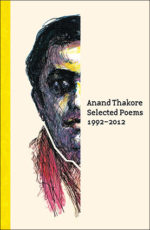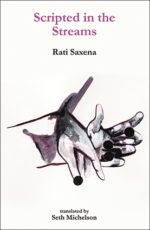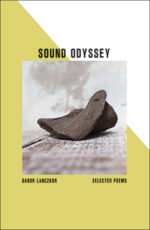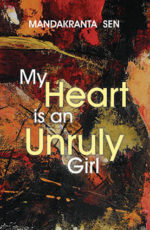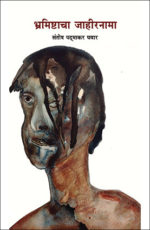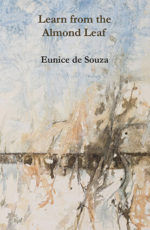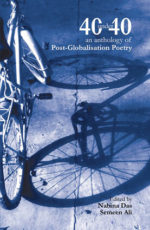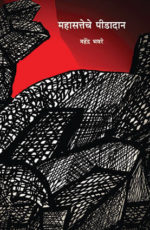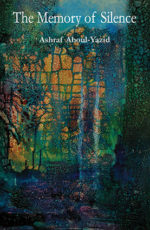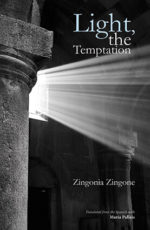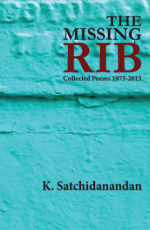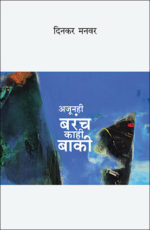-
Banaras And The Other
$14About the Book
Ashwani Kumar’s poems in ‘Banaras and The Other” are a mischievous irreverence turned at times to the present and at times to the past. The personal and the political, memories and nostalgia, mythical characters and contemporary parodies mix and mingle in these poems in diverse proportions to produce a rare poetic energy that belongs entirely to our times of pain and paradox. –K. Satchidanandan
Ashwani Kumar’s Banaras and the Other captivates us as a delightful romp through myth, folklore and history. Read past the revelry, however, and you will see that it engages passionately and provocatively with the fissured, schismatic scenarios of 21st century India.–Ranjit Hoskote
-
Last-Ditch Ecstasy
$14About the Book
Adrian Grima in collaboration with his talented and unusually resourceful translator, Albert Gatt – has produced a rich and memorable compilation of poems. Their geographical and emotional stew is international in its flavours yet always Maltese in its complex marinations. Grima succeeds in being – and these are potent combinations – both lyrical and true-to-life, both tender and unblinking, both comforting and challenging. His collection is a thought-provoking joy.- Jim Crace
How can the soul survive the world’s brutality. This is the essential, unanswerable question that Adrian Grima asks in and through his poems, beautifully translated from the Maltese by Albert Gatt. Taut with unexpected collusions, the poems walk the tightrope tensions of time and space. Turmoil, both emotional and political, is contained within the ascetic rigour of the lines; the mysteries of the distant are brought closer through eyes and lips, taste and touch. In Grima’s world, a lull can be as keen as a knife, blood can be the ultimate betrayal. An arterial anxiety courses through his work. Between “thistle and sun”, between skin and skin, between “departure and return”, the poet repeatedly alerts us to the heart-breaking fragility of the body, besieged. Coexistent with his bruising awareness of damage is his faith in contact, in simple human pleasures, a conversation, a pot of flowers, a meal. Deeply intelligent and moving, here is a book with “sky in its wings, migration in its heart”. Read it, be shattered, then soar.- Sampurna Chattarji
-
The Cosmonaut in Herge’s Rocket
$3‘In this collection, Arjun Rajendran is unapologetically cosmopolitan, yet rooted in the gritty’
Realities of Indian city streets and our ghostly middle-class parlours, Rajendran’s poems excel in the juxtaposition of seemingly disparate elements, geographies, texts and tropes. Yet it is in these juxtapositions that Rajendran finds both the rhythm of a dirge that would mourn our broken contemporaneity, and celebrations of small moments of solidarity and creativity. With this collection, Rajendran provides a definitive push to the very idea of contemporary Indian English poetry.’ -Nandini Dhar, Author of ‘Historians of Redundant Moments’
Arjun Rajendran’s Cosmonaut in Herges Rocket never fails to surprise and provide something new. So many times, these poems stopped me in my tracks, holding my breath. The poems here create a world: we are given Anna Karenina and the stickers on a Rubik’s Cube, Archie Andrews and the death of a hedgehog, a lost (and found) copy of Lolita and the Bible described as ‘the oldest bestseller about hell.’ All of these -and much more – are made new again, brought into connection with each other to form new constellations from the world we thought we recognized’. -Jennifer Finstrom, Poetry Editor, Eclectica Magazine
“Arjun Rajendran’s poetry mixes the scientific, the symbolic, and the speculative. One poem includes the Dyson sphere, another has a superstitious mother who has quit eating mangoes; one poem talks of a friend coming out, another plays on the Hardy-Ramanujan number. But the unique guile of this poet comes through when all of this happens together. Such that a poem of nostalgia mutates into one about global warming; such that a poem arrives at a longing for comics through the wild route of space travel. One reads Rajendran’s poems with the warm knowledge that he is a poet who can do anything. He is my favourite contemporary poet, and definitely one of India’s finest.’ – Tanuj Solanki, Author of ‘Neon Noon’
-
Scripted in the Streams
$12About the Books
There is an intense humanity in these poems by Rati Saxena, a humanity that ennobles all of us who are humble enough to listen. There is an empathy is these poems for all living things – for the spider, for the ant, for the owl – and a similar understanding of all things that may not be alive. -Alan Titley, Professor Emeritus of Modern Irish, University College, Cork It has travelled a long, long way this voice?and we welcome it as we would do a stranger, into the West where despair, decline and decay are seemingly permanent lodgers, Saxena’s lyrics arrive like a fresh breeze. New-born, fresh and smelling of the earth, her poems draw on the well of Indo-European tradition, the intimate links that bind the female psyche and the landscape in all its fecundity. -Dr Michel h’Aodha, University of Limerick Saxena allows for different aeons to melt into each other. She creates a world in which humans interact with insects and animals. We are all of and from the same source. The image of the snake is a powerful one to explain the frustrations of modern women in today’s India. Her vision makes a mockery of the boundaries around our lives and we sail with her through a magical world, coming into contact with the source of life itself. There are echoes of Flann O’ Brien in the delightful poem about the bicycle of her youth. Taboos and rituals will not enslave her and poetry finds its way into the washing on the line and the fire that bakes our daily bread. – Ceaiti Ni Bheildiuin, poet In this selection of the poems of Rati Saxena we are drawn into a world of imagery where deep respect is shown for the low -Brian O Conchubhair, University of Notre Dame, USA
-
Sound Odyssey
$16About the Book
Gabor Lanczkor’s poems represent a uniquely unfledged, intriguing way of approaching artistic traditions and geographies; contemporary and ancient, human and non-human. The Hungarian poet’s themes range from psychedelic prosody of love and darkling austerity of re-imagined Greek myths to the wildly unconventional literary re-creation of intimate vision of the Indo-Hungarian painter Amrita Sher-Gil and the Spanish Francisco Goya’s Black Paintings. American poet and essayist Jeremy Faro and prominent Indian translators and poets Rita Malhotra, Terry Verma and Ashwani Kumar have collaborated on this English anthology of Lanczkor’s poems.
-
Walk Like Monsters
$12About the Book
These are late night poems of the body that sing also of catastrophe, how wide it is, how easy, like ‘being in one place instead of another.’ Anindita Sengupta’s new book is hot, harrowing and masterful. It will stay with me for a long time. ~ Jeet Thayil Anindita Sengupta is a poet of the precise line, the measured image, of mediated passion, the sure ending. Her observation is acute, her politics seldom theatrical and her passage from one world to another and from the object to the spirit smooth and subtle. Her poetry proves that silk can wound and knife can flower. ~ K. Satchidanandan “They rise in this landscape, the ancients – old loves, myths, cities, secret revolutions. Anindita Sengupta’s language is forever old and forever new. Fretful, explosive, terrifying. Her poetry will leave you with beautiful scars.” ~ Janice Pariat
-
Collected Poems
$20About the Book
Adman, householder, mystic, public intellectual and ashram devotee, Kersy Katrak (1936-2007) has never quite received his due as a poet. Katrak’s ‘lush, provocative, and very readable’verse has, with its rare but persistent appearance in anthologies of Indian poetry in English, remained in a curious way at once unforgotten and unrecognized. This book aims, at long last,to remedy this state of affairs. It is the very first comprehensive collection of Katrak’s poetic work, most of it long out of print,some of it previously published only in hard-to-find periodicals. Katrak’s poetry resonates powerfully with Wallace Steven’s observation that ‘It is equal to living in a tragic land, To live in a tragic time’. His concerns remain,palpably,our concerns: a search for the everyday alchemy that might translate the visceral potentials of collective life into generative forms of belonging. This problem of the relation between inner energies and outer forms is at the core of Katrak’s work as a poet and a mystic. And it is what binds his esoteric commitments to his career in advertising. The anthropologist William Mazzarella’s critical introduction to the present volume is the first substantive exploration of these connections in Katrak’s life and work.
-
My Heart is an Unruly Girl
$2About the Book
Bold and sensuous, Mandakranta Sen’s poems document the truths of body and desire. Holding nothing back, they spill over the pages and force us to take notice. My heart is an Unruly girl is a worthy addition to feminist poems of love and desire. The rawness of the original Bengali translates beautifully and seamlessly into English. “She who writes poetry in the middle of the night/ With her hair undone – is a witch”, Mandakranta writes. One tends to agree. There is, certainly, an element of witchcraft in these poems, which cast a spell on the readers.
-
Learn from the Almond Leaf
$10About the Book
In these her late poems, the volcano that is Eunice de Souza is still erupting. As in her early work too, what she here ‘upchucks’ is lava, molten lines that burn and glow and leave a permanent mark. The tone, as before, is casual, bantering, close to the spoken idiom that is uniquely hers. When terrible things happen the tone changes, quickens, then relaxes again. Life is bemusing, ludicrous; death even more so. In the work of no other poet I can think of do you find such brevity and grandeur, swiftness of utterance and the unbearable weight of grief, unbearable because de Souza is so dry-eyed. ‘The crone’s still capable/of spite’ she writes in one poem, the old necklace-of-skulls self-irony intact, except that in her case ‘spite’ also means ‘wisdom’. It is easy to forget that the crone is deeply moral as well, and like any moral being she too feels that she’s lived ‘In the wrong season.’ There is plenty in these spare but unsparing poems to remind us of the classical virtues we associate with Bhartrhari, for instance, or a Latin epigrammatist like Martial. These are poems to live by. In time, they will come to be seen as classics of our literature, as many of her earlier poems already are. Arvind Krishna Mehrotra
-
40 under 40
$5About the Book
“The Indian poetry scene has always been considered to be lively, but no better evidence of this fact exists than 40/40. Here we have forty contemporary Indian poets under forty years old, and what we encounter is extraordinarily timely and compelling, providing us the trace of a newly emergent lyric consciousness, simultaneously local and cosmopolitan. Here we have Akhil Katyal reminiscing about being ten years old and growing up in the shadow of the AIDS epidemic, “battling the stars of a virus”; we have Chandramohan S’ witty “Plus-Size Poem” that “does not opt for offshore liposuction”; and we have the speaker of Ishita Basu Mallik’s sonnenizio about going commando under her jeans and turning her beloved into ” an electric remnant bombarding” her “bones with wavelengths.” From Jennifer Robertson’s prose poem about Jesus and Jaipur, Rohan Chhetri’s universe in braille, or Shelly Bhoil’s typographical experimentation, this anthology shows us the pulse of a generation coming of age in an era of mass media and Hindu mythology. I have no doubt that this will be one of those books that when looked back on will have been proven to be seminal and indispensable, introducing us to both the present and the future of Indian poetry.” -Ravi Shankar, Pushcart Prize winning poet and Founding Editor of Drunken Boat * THIS ANTHOLOGY HAS BEEN EDITED BY NABINA DAS & SEMEEN ALI
-
The Memory of Silence
$16About the Book
Ashraf Aboul-Yazid breaks his silence, but in soft whispers. Like the soft susurration of the title of his first book of poems Washwashat Al Bahr (the Whisper of the Sea), his voice speaks to our soul directly, needing no aural recourse. His memories are a map rolled open, containing multitudes- cites and rivers, balconies and butterflies, evenings and sadness. We enter this atlas that is Aboul-Yazid’s selection of poems from his larger oeuvre and are introduced to one of Egypt’s most prolific poets, novelists, translators and literary critics. His poems evoke wehmut, a melancholy located in the acceptance of our transitory-ness in this world, which we inhabit but for two days- ‘A day to open his arms for friends/ And a day for hugging their mirage.’ In the Middle East of the present, beset with strife and displacement, his words are the many cuts on our complacency, rousing us from the safe acts of reading poetry in a book, bringing us face to face with protagonists of a history not of their own making. Those who are cursed to ‘know a homeland’ that is like a visa’. Those, beset with the weight of the past, stand exposed. ‘In the heavy rain; No one feels’ A lonely drop. Aboul-Yazid’s soft voice recounts memories from decades of remembering, mingling beauty and sadness, rising out from the depths of the Nile, into the balconies and mashrabiyas of Benha his hometown, and beyond into a poet?s state of permanent exile. – Mustansir Dalvi poet, translator and cultural theorist
-
Light, the Temptation
$10About the Book
In Zingonia’s new poems it is a similar exercise that is happening. Instead of justifying the ways of God to men, these poems seem to me to be the ways of men and women to God. This daring act of a moment of surrender to the pristine unity of every thing cements the diverse poems here into one epic of mutations and metamorphoses. In this world the persona an Algerian beggar can merge into one of Jesus. Atoms and stars partake of the same reality as a flower. The fractured fates of Shen Fu, Maurice Utrillo and Max Jacob, which are acts of recurrent human tragedy become settings of Divine Comedy. Though the thrust of Zingonia’s poems is indubitably mystical, their mysticism goes beyond orthodoxies and heterodoxies of what is generally considered mystical. Their laconic beauty has the palpability of something militantly this- worldly as if Eternity is indissolubly in love with creations of time. At this point my words want to go back to the eloquent silence of these poems. I am sure other readers of this remarkable work will find these poems as enchanting and enlightening as I did. ‘Light, the Temptation’ is not a work to be read and abandoned. It invites us to contemplate on the rich resonances of its deceptively simple expressions in order to return the world to the world, ourselves to ourselves, meanings to our world where faceless robots are marching blindly towards irredeemable emptiness. – H S Shivaprakash (an excerpt from his introductory note)
-
The Missing Rib (HB)
$11About the Book
This is a dark, powerful, pulsating collection of poems, the effect of which continues to reverberate, disturb and shock one out of one?s complacency long after one has finished reading them.. The Hindu (reviewing So Many Births) Satchidanandan’s poetry is an irresistible mix of the real, surreal, intellectual, sensual, and spiritual. Satchidanandan does not shy away from asking deeper existential questions -of being, freedom, love, compassion, nature, language, death Shanta Acharya (reviewing While I Write in Modern Poetry in Translation) Satchidanandan’s ‘I’ tells stories about itself, and like all good story-tellers, by telling its own story, his ‘I’ ends up telling stories about others as well. There is an ethical bent in this aesthetic enterprise, where fondness and empathy towards others enter your lines and transform your poetry the way they once transformed your life. Manash Bhattacharya (reviewing While I Write in Biblio) K. Satchidanandan is definitely not a poet who keeps aloof from the world. He is a poet on a journey.. Poetry for him is a cry against all walls? It is his cosmopolitanism that makes Satchidanandan interesting beyond India. Dr. Wolfgang Kubin (Reviewing the German collection, Ich Globe Nicht an Grenzen in Orientierungen: Zeitschrift zur Kultur)
-
The Missing Rib (PB)
$11About the Book
This is a dark, powerful, pulsating collection of poems, the effect of which continues to reverberate, disturb and shock one out of one?s complacency long after one has finished reading them.. The Hindu (reviewing So Many Births) Satchidanandan’s poetry is an irresistible mix of the real, surreal, intellectual, sensual, and spiritual. Satchidanandan does not shy away from asking deeper existential questions -of being, freedom, love, compassion, nature, language, death Shanta Acharya (reviewing While I Write in Modern Poetry in Translation) Satchidanandan’s ‘I’ tells stories about itself, and like all good story-tellers, by telling its own story, his ‘I’ ends up telling stories about others as well. There is an ethical bent in this aesthetic enterprise, where fondness and empathy towards others enter your lines and transform your poetry the way they once transformed your life. Manash Bhattacharya (reviewing While I Write in Biblio) K. Satchidanandan is definitely not a poet who keeps aloof from the world. He is a poet on a journey.. Poetry for him is a cry against all walls? It is his cosmopolitanism that makes Satchidanandan interesting beyond India. Dr. Wolfgang Kubin (Reviewing the German collection, Ich Globe Nicht an Grenzen in Orientierungen: Zeitschrift zur Kultur)
-
The Owl and the Laughing Buddha
$12About the Book
The poems in The Owl and the Laughing Buddha bring a ‘lighthouse sweep of attentiveness’ to their subjects. This is a book about noting, from the title poem’s companionable but contrasting figures on a writing desk to the devastating aftermath of a cloudburst in the mountains, and from a flier’s eye-view to a walker’s – and a mole’s. Here are poems interested in gods and figures of myth, and in observing houses, trees, birds and other creatures in a changing neighbourhood; poems that talk shop with fellow poets and respond to works of art and culture; and poems that watch our responses to the daily catastrophes that sometimes constitute ‘news’ – whose interest is no less a matter of whimsy, perhaps, than some of the tales narrated in the final section of the book. Yet the poems rest on an implicit conviction that everything must be given its due and treated seriously – though not solemnly, for it is mirth, after all, that is the laughing Buddha’s centre of gravity. Treading margins between the real and the imagined, the concerned and the tongue-in-cheek, this is Menon’s third collection of poems.
-
Ajunahi Barach Kahi Baaki
$16About the Book
This is Dinkar Manvar’s second collection of poetry. A very powerful voice in Marathi; the poems in this collection are hard-hitting and honest showcasing life at its honest best.

